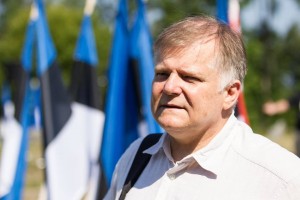Jüri Estam - Tallinn
November 19, 2019
Foreign Minister Reinsalu has said in a radio program aired by the Estonian public broadcasting organization ERR that the country of Estonia will not retreat from the underpinnings of the Peace Treaty of Tartu if she is to finally ratify a new border treaty with the Russian Federation.
Reinsalu said: "The standpoint of the Republic of Estonia is that the principle ensconced in the Second Article of the Peace Treaty of Tartu is in effect. Our understanding of (the illegal annexation) of Estonian territory is connected to this, as is the restoration of our national independence. We did not (in August of 1991) create a new state. This is the most primary understanding of the entire foundation that our state rests upon, and pertaining also to the past of our state, and is therefore also deeply related to the matter of bilateral relations (with Russia)".
Reinsalu's statement is a reaction to comments made at the beginning of the week to the Russian RIA Novosti agency by Sergei Belyayev, Director of the Second European Department at the Russian Federation's Ministry for Foreign Affairs. Belyayev complained about a "worsening of Estonia's attitude towards Russia" and claimed that key Estonian ministers, including Reinsalu, have publicly presented territorial demands against Russia, "based on the Tartu Peace Treaty of 1920, which is no longer in effect."
Reinsalu said in return that if Russia insists on tying a new border agreement with political conditions, he sees no prospect for a ratification of an Russian-Estonian border treaty in the near future.
The general sentiment in Estonia is that there is no reason to regard the Peace Treaty of 1920 as not being in effect.
The 100th anniversary of the treaty happens to be just some months away, having been signed on February 2, 1920 between Estonia and Soviet Russia, thus ending Estonia's successfully waged War of Independence.
In the second article of the treaty in question, Soviet Russia renounced in perpetuity all rights to the territory of Estonia. Ratifications of the Peace Treaty of Tartu were exchanged in Moscow on March 30, 1920. It was registered in League of Nations Treaty Series on July 12, 1922. The UN has now taken over, in Geneva, the function of housing treaties that came into force during the existence of its predecessor, the League of Nations.
The USSR later forcibly incorporated the Baltic States in 1940, and annexed significant amounts of land from Estonia and Latvia at the end of World War II, absorbing these annexed territories into the Russian Soviet Federative Socialist Republic.
The Estonian Foreign Minister is a jurist by education.
As February 2 approaches – meaning the 100th anniversary of the signing of the treaty in the southern Estonian city of Tartu – this source of friction pertaining to territorial issues will in all likelihood become topical again in the Estonian and possibly also the Russian media.
Estonian Foreign Minister Urmas Reinsalu Digs in Concerning Border Issue with Russia
Eestlased Eestis | 19 Nov 2019 | EWR
Eestlased Eestis
TRENDING




























